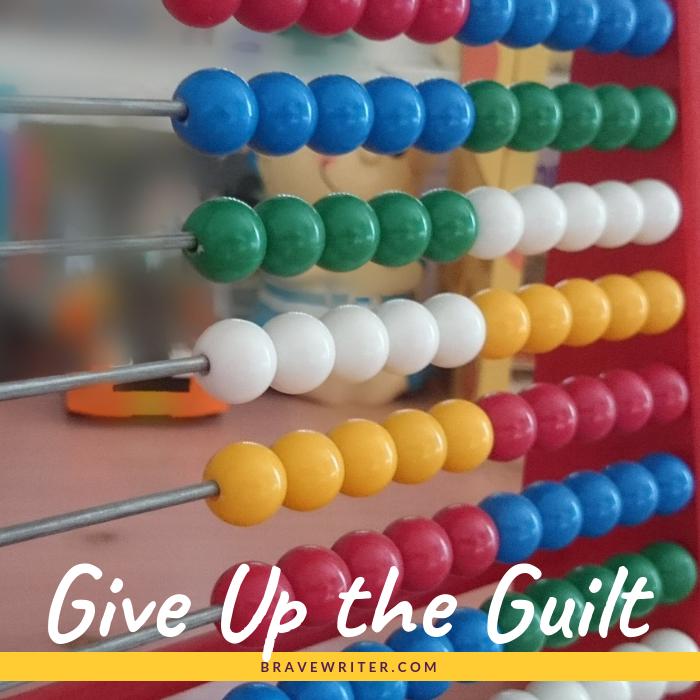Give Up the Guilt

As your “I’m so done with this year; so now I’ll think about next year” brain kicks in, let’s help it to plan in a sane way! The temptation is major overhaul and doubling down on the subjects that got short shrift this year.
Writing is often in that category. You look back at the scraps of freewriting and the incomplete report that your daughter wrote, but never copied over and you resolve to not let THAT happen again.
So you begin. You plan to have each child complete a single writing project per month, the way I tell you to. Or so you think.
We know that it’s important not to rush through the writing process, to allow time for research and revision. This once-a-month scheme sounds sane compared to curricula that suggest writing an essay every week, or a paragraph a day including drafting and revision!
However, what if you have five kids (like I did)? What if all five are capable of writing?
Let’s do the math. There are ten months in a school year. Five kids. Each doing one writing project per month. Even I can make that calculation: 50 writing projects, in a single school year.
Ha!
Do you think I supervised successfully 50 writing projects in a year? Do you think any home educator is supporting the production of 50 completed writing projects at five different levels in a single school year?
I’m here to tell you: we are not. I talk to home educators all the time. What leaks out in their moments of desperate confession is that they fear they are not doing enough writing. Some are not doing any writing, because of the paralysis that results from staring at a curriculum that requires even MORE writing than ten projects per child in a year.
So here’s my rule of thumb.
You want each of your kids to experience your hand-holding, super kind, invested involvement in one or two big writing projects per year—
- where they have a start (original draft, freewrite, list, notes, dictated narration to you),
- a middle (rereading, adding new stuff, research, taking out stuff that doesn’t fit),
- and an end (editing the grammar, spelling, and punctuation, typing it up, reading it to interested readers),
- all accompanied by your availability and caring.
The rest of the time, attempt lots and lots of writing projects or pursue lots and lots of writing opportunities. It’s totally fine to, for instance, start any writing project in our materials and NEVER finish it! Maybe the meat of the project was simply attempting, or collecting, or getting an initial draft, or working through the research but never writing. Maybe the fantasy of the project was enough—talking about what it could be, or what your child wished he or she could do.
Kids are developing—they are not complete themselves. Sometimes you have to have lots of fantasies about what you might be able to do some day before you get the cajones and courage to try!
Maybe you decide to do a group writing project where one kid does the artwork and another does the writing and a third edits it and lays it out on the computer. That counts! For everyone!
Freewriting weekly is a great practice and never requires revision, unless you and the child want to.
Reading books, playing with words, watching TV, language games, poetry tea times, listening to books on CD, memorizing song lyrics, telling jokes, leaving Post-it Notes with love messages on the doors of bedrooms, having Big Juicy Conversations, going to the movies…
That ALL counts as writing program.
You can certainly work through a writing project or two from start to finish with your kids this year (with each one)—and it will be enough if you actually do it and trust that it IS enough. Too often in our defeat, we give up completely or do a half job and then entertain ourselves with guilt.
Give up the guilt. Plan to get through the process with your kids 1-2 times a year (more is a wonderful bonus—and I promise, as you get better at supporting the complete writing process, it will be easier to do and more enticing). Not only that, as your kids understand the writing process, they will need you less!
So let’s get realistic about the coming year.
- Lots of writing and reading and word play and conversations.
- Some fantasizing, starting and stopping, trying and abandoning of writing projects.
- A few start-to-finish supported writing project completions.
Okay?
You got this.



















I love this post! Thank you so much. While my son is entering high school (homeschooling) and we have to provide a certain number of writing samples, your post has helped me not feel so bad about all the writing that hasn’t gotten done over the years and to remind myself to not go crazy next year.
Good for you Daisy!
Julie